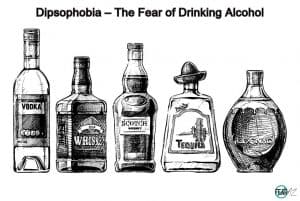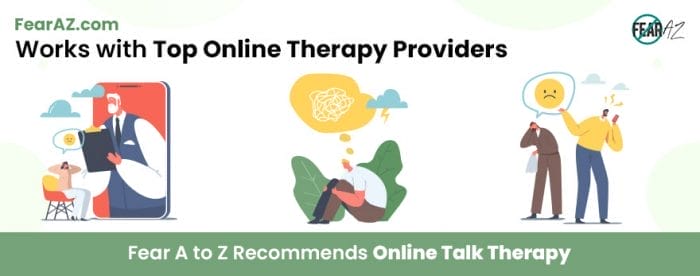Share This Article
Fear of Drinking Is Beyond a Social Phobia
Do you avoid social events and parties where alcohol is served? Do thoughts or talk of alcohol make you sick?
Your friends and family may have dismissed it as abstinence, but you know you don’t have a choice—you are deathly afraid of drinking alcohol. If you’re afraid of having a drink, then you’re probably tired of explaining yourself at parties and celebrations.
What you want is to get better, to no longer have to explain why you hate the idea of alcohol. You want to turn an irrational fear into a choice. To do this, you need to go deeper and look at the reason for your fear.
A closely related phobia is Potophobia – Which is a fear that you’ll lose control while drinking and not know what you may have done.
What Causes the Fear of Drinking Alcohol?
A simple Google search for ‘why do I have a fear of alcohol?’ will show a dozen dipsophobia articles and dipsophobia images. You’ll see images of men and women clutching their heads in frustration as alcohol bottles and glasses innocently surround them. Dipsophobia covers both the fear of alcohol and drugs.

Know that alcohol is not to be blamed for your fear. So, what then could be the cause of your fear of alcohol?
Dipsophobia, like any phobia, is an irrational fear caused by a genetic disorder, trauma, biological, or environmental factors. Let’s look at possible dipsophobia causes.
- If you are genetically predisposed to mental/emotional disorders, then you are prone to having an anxiety disorder or phobia. If a person with a genetic disorder experiences a stressful event in life, their fear may revolve around details from that event.
- A severe biological reaction to alcohol at a young age can instill long-term fear in a person. Traumatic experiences in life can also trigger a strong aversion to alcohol. The death of a loved one from alcohol abuse, an alcoholic parent, or an abusive alcoholic parent, etc. can all cause a fear of alcohol.
- Religious beliefs can also cause someone to develop a fear of alcohol. While it may not be rational, beliefs can make a person perceive alcohol or the act of drinking a sin. They expect to be punished for drinking, tasting, or even thinking about alcohol. Over time, these thoughts lead to heightened fear responses that make life difficult for the person.
- These thoughts could also develop if a child receives harsh punishment from parents for having tasted alcohol.
- It is also possible that a person had a close encounter with death due to their drinking habits. This experience changed their attitude towards drinking. But instead of learning to drink in moderation, the person developed an irrational and debilitating fear of alcohol. Fear can be a person’s way of dealing with their past drinking behavior and can be a way to punish themselves.
Everything You Need to Know about Dipsophobia
Dipsophobia etymology shows the term is a combination of the word dipso meaning “thirsty” and phobos meaning “fear.” It is also known as potophobia or methyphobia. Interestingly, the chances of developing dipsophobia are the same whether you consume alcohol or not.
Dipsophobia is called the fear of drinking alcohol, but the actual fear experienced can have many aspects. A person may be afraid of the drink, its effect on the body, or the consequences of drinking. All these might be different phobias, but since they are all centered around alcohol and its consumption, we categorize them as dipsophobia.
Symptoms of Dipsophobia
Dipsophobia symptoms are easy to spot as alcohol is widely and commonly consumed. It is easy to notice someone who has an irrational fear of drinking alcohol.
Physical Symptoms
- Sweating
- Muscle tension
- Nausea
- Dizziness or trembling
- Stomachache
- Headache
- Panic attacks (or symptoms of an attack)
- A reaction similar to allergy after drinking alcohol
Mental/Emotional Symptoms
- Avoiding alcohol
- Anxious thoughts about accidentally consuming alcohol
- Nervous around alcohol
- Isolation from alcoholics and the drinking population
- Anxious when thinking about alcohol
- Fear of the consequences of alcohol consumption
How to Deal with Dipsophobia
Most dipsophobes are confused as teetotalers. Many times, panic attacks are dismissed as an overreaction or attention-seeking behavior. If you received these reactions, it can make you feel cut-off and depressed. All your conversations about your fear of alcohol become strained and stressful.
Luckily, the phobia is easy to diagnose once you know the symptoms, and a variety of dipsophobia treatments are available.
What You Can Do to Help Yourself
If you often ask yourself How do I get over my fear of drinking?, then getting a professional diagnosis should be your priority. As you start counseling sessions, you can also try the following self-help tips to support your mental health:
- Write down your thoughts in a journal. You don’t have to revisit these notes, but a good practice while journaling is to notice when you’re having unhelpful thoughts, so you can work on changing them.
- Go for a run or a brisk walk once a day for 30 minutes. Walking helps get rid of toxins and supports the biochemistry needed to keep you calm during your therapy exercises. You can also try to squeeze in mindfulness meditation at the end of the day to help you wind down and get better sleep.
- Dietary changes can also help. If you’ve been chugging coffee multiple times a day, then you could be setting yourself up for failure. Caffeine is a stimulant and can worsen anxiety.
Professional Help for the Fear of Drinking Alcohol
Cognitive therapy is the first step in treating dipsophobia. A trained counselor will discuss your fear with you. To find the root cause, your counselor needs to understand the history of your phobia. This helps identify root causes and helps with rationalizing the problem.
- Talk therapy is useful in helping patients face down their fears in a controlled environment. Once an appropriate level of desensitization towards alcohol has been reached, patients can start taking small steps in real-life situations.
- You can also turn to support groups for therapy. Groups work by bringing together those who suffer with similar problems. This helps build a sense of affinity between individuals who want to overcome their fears. Group participants share their stories and can help motivate each other. It also brings more ideas and suggestions to the table such as to which therapy and activities are helpful.
- Medication should complement other forms of therapy. Therapists prescribe antidepressants, anti-anxiety pills, and beta-blockers to help patients stay calm. However, medication only provides temporary support. As soon as an individual has learned to cope with the fear, they should be weaned from their medication.
Learning to Cope with Dipsophobia
Most times dipsophobes will have an unrealistic view of the world, since their ideas and perceptions are built around their fear. However, it is possible to become aware of the irrationality of one’s thoughts and behavior as it is happening and learn to deal with them.
If you’re tired of being irrationally afraid of alcohol, seek help. Look forward to the day when you can take part in a simple celebration without dreading the toast. You can learn to trust yourself to drink responsibly and with moderation given enough time and therapy.




